This is the place where everything comes together and where I create an archive for my thoughts and research.
Don't wanna be here? Send us removal request.
Text
youtube
interview Mariska, dominant narrative
0 notes
Text
youtube
interview Glenn
0 notes
Text
youtube
Delivery for assignment 5, recorded interview
interview Jona, counter narrative
0 notes
Text
youtube
Interview Samantha & Leontine
0 notes
Text
Questions interview Glenn
Where are you from and what dialect do you speak?
Who taught you the dialect?
Describe your first experience in which you noticed that having a dialect worked against you?
What are some prejudices you have encountered regarding your dialect? In what places or situations did this take place?
What challenges has having a dialect brought you? In what ways?
Have you tried to hide or unlearn your dialect/accent?
To what extent has this changed the image you have of yourself and your identity?
What effect has hiding/learning your dialect had on your chances on the labor market?
To what extent do you think that to be professional you need to have a good command of Standard Dutch? Also with regard to your field.
How has hiding/learning your dialect affected your interactions with your family and friends back home?
In what situations do you return to your dialect? And with whom? Describe the feeling you get from this.
Have there been times when you have received positive reactions to your dialect?
What are your thoughts on the term General Civilized Dutch? How does this make you feel? Do you think this term is appropriate?
Have you ever regretted (a little) hiding/forgetting your own dialect?
0 notes
Text
Questions interview Mariska
What are the challenges of a teacher when teaching Dutch to children with their own accent/dialect?
As a teacher, what actions do you take with a child who has an accent or dialect? What methods are used for this?
Can you tell me more about your school's guidelines or policies regarding dialect use in the classroom?
The term ABN (General Civilized Dutch) is still often used to refer to Standard Dutch, what do you think of this term?
To what extent do you see differences between children who master Standard Dutch and children with an accent/dialect? Does this also relate to their socio-economic position?
What and how important is it that children master Standard Dutch? To what extent could this affect their future?
What are the possibilities within education to preserve dialects and accents without hindering the acquisition of the standard language? As a teacher, do you also incorporate this into your own lessons? And how?
To what extent do you, as a teacher, think that education contributes to the disappearance of dialects within society by mainly teaching Standard Dutch?
0 notes
Text
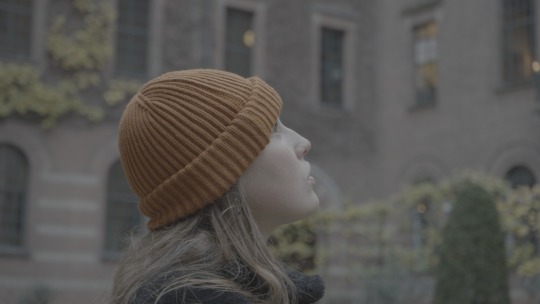
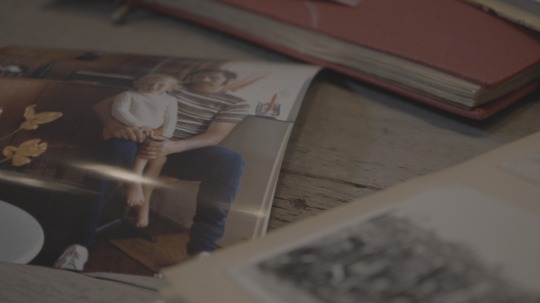
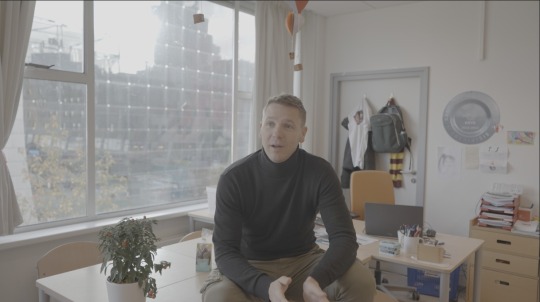
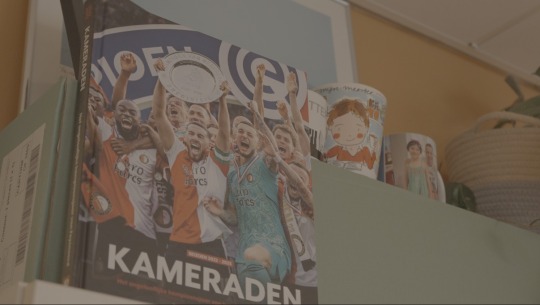

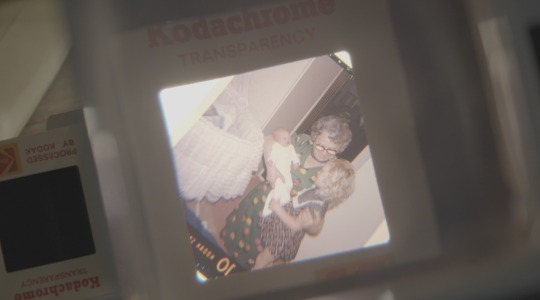
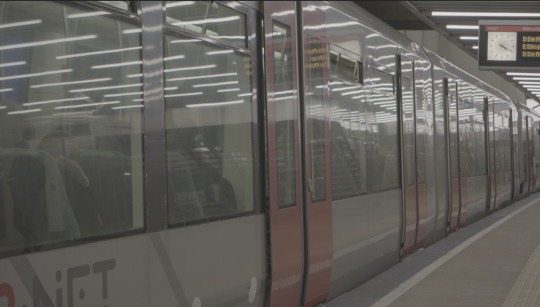
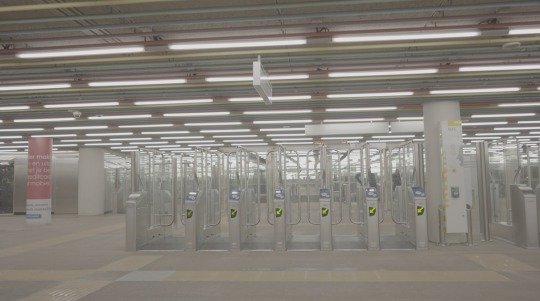
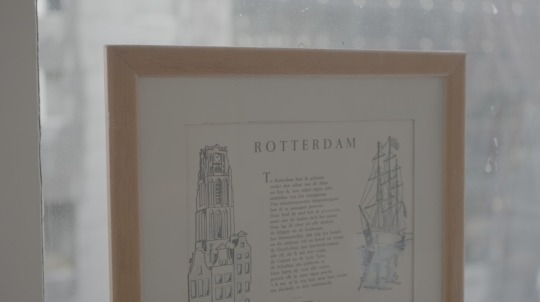
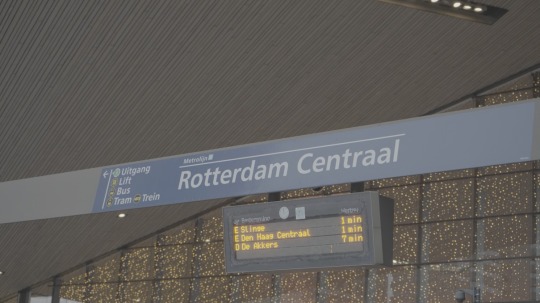
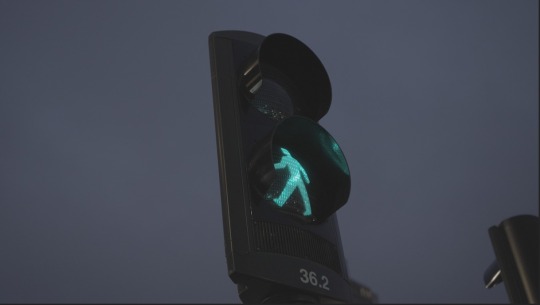
Work in Progress.... Here are some (unedited) shots of the documentary I'm working on.
0 notes
Text

Assignment workshop 4
Translation: DOCU / Interview Jona
WHAT IS THE DOCUMENTARY ABOUT?
Dialect is spoken less and less, you could say that it is gradually disappearing. In this documentary I want to talk to people from education about their views on dealing with dialects and accents in education. Does education have a role in the disappearance of dialect? And what are the advantages of mainly learning Standard Dutch? In addition, I would like to highlight an experience about unlearning dialect for better job opportunities and the prejudices that come with it. What are the challenges of looking for a job if you speak a dialect? The answers to these questions are used to add and strengthen the stories of my own family, in particular my grandfather. This documentary is all about keeping the language alive and the value of dialect. Because if the people who teach us the dialect disappear, will the dialect disappear with them?
HOW ARE WE GOING TO TACKLE THIS?
I want to use having a conversation as the method of interviewing. I think it is important to hold the interview in a nice and safe environment in which you feel comfortable. We can find a location for this in consultation, this can be at home or at work, where you feel most comfortable. The choice is yours. For this topic we could see if there is a space within the school where it is pleasant to have a conversation.
QUESTIONS
For our conversation, I have a few questions I'd like to ask. 1. What are the challenges of a teacher when teaching Dutch to children with their own accent/dialect? 2. What are the advantages and disadvantages of encouraging dialect use in the classroom? 3. As a teacher, what actions do you take with a child who has an accent or dialect? 4. What are the reactions of students or parents to your own accent/dialect use in the classroom? 5. Can you tell me more about your school's guidelines or policies regarding dialect use in the classroom? 6. The term ABN (General Civilized Dutch) is still often used to refer to Standard Dutch, what do you think of this term? 7. To what extent do you see differences between children who master Standard Dutch and children with an accent/dialect? Does this also relate to their socio-economic position? 8. What and how important is it that children master Standard Dutch? To what extent could this affect their future? 9. What are the possibilities within education to preserve dialects and accents without hindering the acquisition of the standard language? As a teacher, do you also incorporate this into your own lessons? And how? 10. To what extent do you, as a teacher, think that education contributes to the disappearance of dialects within society by mainly teaching Standard Dutch?
This interview is with the teacher that is pro-dialect in the classroom
0 notes
Text

assignment Workshop 4
Translation:
OBJECTIVE
The aim of this documentary is to create awareness about the fact that the use of dialect is decreasing and what factors influence this. I also want to share personal experiences about prejudices about dialect. As a creator, I want to pay tribute to the people who taught us the dialect but are no longer there and that the words should not disappear with them.
PERSPECTIVES
The perspectives that are neglected within the existing archives are people who are pro dialect in the class, a person who had to unlearn their dialect in order to fit in and a person that can speak from both sides of the spectrum (in favor of speaking dialect, but can see the importance of speaking standard dutch)
0 notes
Text
A vanishing voice.
Unlearning your dialect is the price you pay for a better future.
As a little human, you go from babbling to small words, from words to sentences and from sentences to conversations. The most important people in your life teach you how to speak, interweaving their speech features such as accents in dialects into your way of speaking. By this they transfer parts of their culture, heritage and identity into yours. It gives you a feeling of belonging, warmth and home. But when these people who taught you your dialect vanish, do the words we hold on so dearly disappear with them? Will it only be a memory?
Dialect is a linguistic feature that enriches your identity and portrays the proudness of your heritage. Although this is a beautiful thing, there are many biases about speaking dialect that have an effect on how easy your path in life will be. People are seen as dumb, antisocial, poor or lesser than people that speak “General Civilized Dutch”. This has an effect on the chances they get on the labor market, social situations and other chances they get within society, and therefor is discrimination based on linguistic features.
To get more in dept about this part of my research I will speak to creative copywriter and director Susan Zwijgers. She was born in Brabant and has lived there her whole youth. After graduating the Willem de Kooning Academy she went to the creative center of advertising in the Netherlands, Amsterdam. When applying for jobs, she encountered several biases about her speech. Due to rejection after rejection, she decided to actively unlearn her dialect. After this she finally got her dream job, but at what cost? I wonder if she regrets unlearning the dialect and what biases she encountered in her job search.
The educational system is very aware of this problem and instead of finding a way to let 2 languages live next to each other, they encourage to unlearn your dialect which indirectly means losing a part of your identity. Also, people who want to grow on the social ladder and apply for a higher job, try to unlearn their dialect themselves to increase their chances for the position. This way dialects are vanishing and are less and less spoken by the current and next generations.
To highlight the different perspectives in the education system about this topic, I speak with 2 primary school teachers. One in favor of using dialect in the classroom, the other against it. What are their arguments and to they think there is a middle ground?
The goal of this research is to show how ridiculous it is to think that speaking a dialect negatively influences people their intellect, creativity, wealth or social skills in any way and that dialect can live next to the existing curriculum so that we can preserve all these unique dialects. I want people to see the value of being unique and to preserve that trait.
Bibliography:
NOS op 3. “Dealen Met Je Dialect: Op Je Werk | NOS Op 3.” YouTube, 22 Sept. 2017,www.youtube.com/watch?v=1Kc2uPZ2AJE.
“Waarom Hebben We Vooroordelen Over Dialecten En Accenten? - BNNVARA.” BNNVARA, www.bnnvara.nl/artikelen/waarom-hebben-we-vooroordelen-over-dialecten-en- accenten.
“Dealen Met Je Dialect: Trots Op Je Taal | NOS Op 3.” YouTube, 24 Sept. 2017, www.youtube.com/watch?v=ykQ6twtLMw0.
“Steeds Minder Mensen Spreken Dialect, Gaat Het Verdwijnen?” DPG Media Privacy Gate, www.ad.nl/play/productie/steeds-minder-mensen-spreken-dialect-gaat-het- verdwijnen-328820.
“Dealen Met Je Dialect: Uitschelden En Uitlachen | Nos Op 3.” YouTube, YouTube, 23 Sept. 2017, www.youtube.com/watch?v=MRnU8ZII5ZU.
1 note
·
View note
Text
Abandoning your identity.
Unlearning your dialect is the price you pay for a better future.
A dialect is an unique linguistic feature that enriches your identity and portrays the proudness of your heritage. Although this is a beautiful thing, there are many biases about speaking dialect that have an effect on how easy your path in life will be. People are seen as dumb, antisocial, poor or lesser than people that speak “General Civilized Dutch”. This has an effect on the chances they get on the labor market, social situations and other chances they get within society, and therefor is discrimination based on linguistic features.
The educational system is very aware of this problem and instead of finding a way to let 2 languages live next to each other, they encourage to unlearn your dialect which indirectly means losing a part of your identity. Also, people who want to grow on the social ladder and apply for a higher job, try to unlearn their dialect themselves to increase their chances for the position. This way dialects are vanishing and are less and less spoken by the current and next generations.
The way I want to encounter this project is to share stories of my own family history and to connect them with society today. I want to follow other people their stories on how they tried to unlearn their dialect and how their identity shifts from being in the work field and to what they identify as home and to tell about the sacrifices they made. Next to that I want to hear the perspective from the educational system and how they think about how they keep these biases alive by unlearning children their dialects.
The goal of this research is to show how ridiculous it is to think that speaking a dialect negatively influences people their intellect, creativity, wealth or social skills in any way and that dialect can live next to the existing curriculum so that we can preserve all these unique dialects. I want people to see the value of being unique and to preserve that trait.
Bibliography:
NOS op 3. “Dealen Met Je Dialect: Op Je Werk | NOS Op 3.” YouTube, 22 Sept. 2017,www.youtube.com/watch?v=1Kc2uPZ2AJE.
“Waarom Hebben We Vooroordelen Over Dialecten En Accenten? - BNNVARA.” BNNVARA, www.bnnvara.nl/artikelen/waarom-hebben-we-vooroordelen-over-dialecten-en- accenten.
“Dealen Met Je Dialect: Trots Op Je Taal | NOS Op 3.” YouTube, 24 Sept. 2017, www.youtube.com/watch?v=ykQ6twtLMw0.
“Steeds Minder Mensen Spreken Dialect, Gaat Het Verdwijnen?” DPG Media Privacy Gate, www.ad.nl/play/productie/steeds-minder-mensen-spreken-dialect-gaat-het- verdwijnen-328820.
“Dealen Met Je Dialect: Uitschelden En Uitlachen | Nos Op 3.” YouTube, YouTube, 23 Sept. 2017, www.youtube.com/watch?v=MRnU8ZII5ZU.
0 notes
Text
Note to reader
Sun radiating through the window on our smiles from ear to ear, warming up the room together with the chatter and laughter. I feel comfort in the shouting, laughing and words cheering up the ambience of the room. Talking to each other makes the dialect heavier and heavier and in the time being the box of curse words is getting opened, tears in our eyes. Always from laughing, but not that day. The day we lost you, and with you my home and the personification of the dialect that made us express ourselves every time that the whole family was brought together. The warmth that we felt, the warm bath we dove in every time we gathered at yours, began to cool down. And with that I noticed that outside of my family bubble less and less people knew the words we used to shout at each other or would whisper so softly.
There have always been differences between the words I know, my mother knows and my grandfather new because dialect changes through the years. But when some generations come to an end, do the words die with them? Is everything that gave me warmth and comfort, a feeling of belonging going to fade away and vanish?
At schools they try to unlearn dialect from children because this would influence the extent to which they would have a successful job later. What makes a child without a dialect smarter than a child that does? And can't these two languages just live side by side? It feeds the prejudice that people who speak dialect are less smart or successful.
As humans we want to belong somewhere, to identify with others. Dialect is a language that a certain group of people from the region speaks that you can connect with. This also brings a positive feeling of pride, warmth and security. But does not speaking ABN (General Civilized Dutch) mean that you are not civilized?
I want to take you on a journey through the archives of my family history and the tales that have been told for years as a read line through my research about the impact of dialect on your position within society. We take a look at the prejudices surrounding people who speak Rotterdam dialect while sharing the stories about the people behind the prejudice to take a deeper look into their reality.
0 notes
Text
Annotated Bibliography
Focus
The bias I am researching is: “People who speak dialect are less likely to rise on the social ladder.”
Sources List
“Roorda Laat Provinciale Helden Shinen in Verkiezingscampagne.” Roorda Reclamebureau, www.roorda.nl/werk/roorda-laat-provinciale-helden-shinen-in-verkiezingscampagne.
Oudenaarden, Jan. Wat Zeggie? Azzie Val Dan Leggie! / Druk Heruitgave: Een Onderzoek Naar Het Dialect Van Rotterdam. 2015.
NOS op 3. “Dealen Met Je Dialect: Op Je Werk | NOS Op 3.” YouTube, 22 Sept. 2017, www.youtube.com/watch?v=1Kc2uPZ2AJE.
Gevonden in Delpher - De Volkskrant. www.delpher.nl/nl/kranten/view? query=dialect&coll=ddd&identifier=ABCDDD:010870798:mpeg21:a0068&resultsidenti fier=ABCDDD:010870798:mpeg21:a0068&rowid=1.
“Waarom Hebben We Vooroordelen Over Dialecten En Accenten? - BNNVARA.” BNNVARA, www.bnnvara.nl/artikelen/waarom-hebben-we-vooroordelen-over-dialecten-en- accenten.
Gevonden in Delpher - Nederlands Dagblad : Gereformeerd Gezinsblad / Hoofdred. P. Jongeling ... [Et Al.]. www.delpher.nl/nl/kranten/view? query=Rotterdams+dialect&coll=ddd&identifier=ddd:010569820:mpeg21:a0053&resul tsidentifier=ddd:010569820:mpeg21:a0053&rowid=1.
Magazine, Gers! “Nijntje in De Diergaarde.” Gers! Rotterdam | Door Gers! Magazine, gersrotterdam.nl/verhalen/stad/647/nijntje-in-de-diergaarde.
“Dealen Met Je Dialect: Trots Op Je Taal | NOS Op 3.” YouTube, 24 Sept. 2017, www.youtube.com/watch?v=ykQ6twtLMw0.
Alicante, Team. “Dialecten Verdwijnen: ‘Over 500 Jaar Kunnen Belgen En Nederlanders Elkaar Niet Meer Verstaan.’” NPO Radio 1, 3 Nov. 2020, www.nporadio1.nl/nieuws/podcast/ 5493e6e6-88f1-4ca9-89ae-f3199aed7a1d/dialecten-verdwijnen-over-500-jaar- kunnen-belgen-en-nederlanders-elkaar-niet-meer-verstaan.
Primary sources
1. Family Archive. The video’s, photo’s and stories from my own family give insight in how your occupation and place on social ladder influences how much you speak dialect, and therefore how you are seen within society. It also shows how dialect changes over the years and how our parents and grandparents play a big role in transferring dialect to us. I plan to use this source as a red line through my story to make it personal, easier to grasp for the viewer/reader and to take a clear position in this story and to tell the story from this particular perspective.
2. Ciska and Petra, Primary school teacher’s. Both Ciska and Petra currently both work at a primary school, but their opinions about the eduction or oppression of a dialect differ a lot. They are actually both on the other side of the spectrum. One is in favor of using dialect in the classroom and does it herself, and the other is strictly against it since it would effect your chances on a good job in the future. I plan to use this source to see if and how education can influence the preservation or suppression of Rotterdam dialect and to see if it can live next to each other.
3. Delpher Delpher is a website where all kinds of printed articles are archived online. This goes back until the 1800’s and there are a lot of historical articles to find about dialect, and also specifically Rotterdam Dialect, from various news sources. There are articles that confirm my thoughts about the development of Rotterdam dialect and why it is fading, but there are also questions and other perspectives which you can read here. I plan to use Delpher to search for articles that can confirm or debunk the interpretations I have about how and why the Rotterdam dialect is fading.
4. Wat zeggie? Azzie val dan leggie!, by Jan Oudenaarden. In this book the author has done research about different kinds of aspects of the Rotterdam. dialect. He dives into words, grammar, expressions, nicknames etc. Why do we say certain words and where does it come from? I plan to use this source as a research document what shows me more about the heritage of the language and to see what it can tell me about the identity of the Rotterdam population. Also I can hold this as a reference to see how people used to speak dialect and how much knowledge the younger residents of Rotterdam currently have.
5. Video: NOS op 3 “Dealen met je dialect.” In this video various biasses about people that speak dialect are shared and how this affects these people in their search for a job or when they are at work. They tell about their experience of discrimination based on their dialect and how they sometimes not get the job because of that. This sometimes means changing their identity while they often are proud of their heritage. I plan to use this source to gain more insight into what people are disapproved of when speaking a dialect and what actions they take to change this.
1 note
·
View note
Text
Assignment: Repositioning Within the Archive
0 notes







